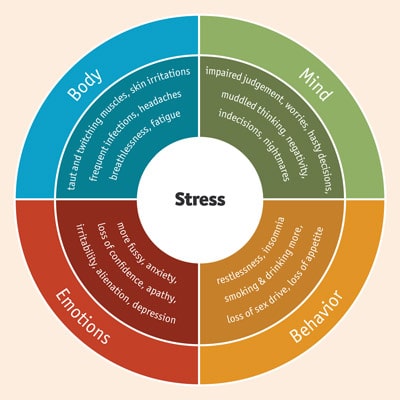First off, who here knows what ‘stress’ really is? You know what it feels like and how your body reacts to it, but what is it actually?
According to the Canadian Mental Health Association, stress is a reaction to a situation and isn’t about the actual situation; when you think that the demands of the situation are greater than the resources you have to deal with it.
Stress can activate the fight or flight part of your brain regardless of whether the ‘threat’ is real or perceived. That means that you’re genuinely stressed whenever you see Tom Cruise stuck in an impossible situation because your brain doesn’t understand fake threats.
What triggers work-related stress? Stress at work is generally a combination of the high demands of the job and a low amount of control over the situation.
Leave work at work
Easier said than done, especially if you’re working from home. An easy way to do this is to add a little activity right after work to break up the day and to create a transition from work to home time.
For example, take a 10-minute walk to help change the environment and break that ‘I’m at work’ mentality. Going to the gym can work too.
If your work requires physical labour, then maybe you can transition by taking a quick nap, relaxing in a chair or doing something physical that you find fun. Walk the dog? Bike ride with the fam? This will help you mentally break away from work and enjoy your evening/after-work hours at home.
Not bringing work home is also a mental game. If you’re still thinking about work or sending work emails after your workday is done, this affects the quality of your home life. If you find yourself bringing work home often, maybe it’s time to talk to your manager to help you figure out how to delegate some of your tasks to co-workers.
Get enough sleep
I know everyone says they don’t get enough sleep, and it often feels like there aren’t enough hours in a day. However, sleep is important to your mental well-being. If you’re not regularly getting 7 to 9 hours a night, you should try making it a priority. This small lifestyle tweak can be life-changing.
There has been some research on optimal times to sleep, and for a person with a regular 9 to 5, these work. For everyone else, if you’re getting 7 to 9 hours of sleep consistently, you’re good.
Going to bed at the same time every night and creating a nighttime routine, such as reducing screen time and limiting the amount of water you drink right before bed, can help lower stress and improve performance at work.
Do you ever stress in the middle of the night? Check out how to fall asleep after waking up from stress.
Eat well
Eating a well-balanced diet helps your body lower stress naturally. Cheat days are okay; however, keep in mind that sugar and fatty foods can make you feel worse if you’re already stressed out. If you find yourself eating crappy foods when you’re stressed, that can be a problem. Here’s how to tell if you’re stress eating.
Studies show that a diet with lots of fruits and vegetables can actually help you feel less stressed. So ditch the processed foods when you can and replace them with meals you make yourself, like chana dal or tandoori chicken. Make extras so you can eat the leftovers for lunch at work the next day.
Stay hydrated
You should aim to drink 8 to12 cups of water a day, depending on temperature, activity etc. Although water is ideal, most fluids count. Even coffee counts towards your daily fluid intake (although coffee can make some people feel more stressed). As does soup, milk, tea, and fruit.
Keeping your brain hydrated is essential in maintaining good emotional and physical health.
Your muscles can cramp up when you’re dehydrated. However, staying hydrated keeps your blood circulation at a healthy level and keeps your heart healthy. Water is essential, just like oxygen. Here are other ways to stay hydrated beyond water.
Take breaks at work
Getting up and moving your body can help ease the mental workload. Check out these easy ways to bust out some moves in your office.
Giving yourself time to breathe is extremely important. If you’re not a big “break-taker” (made-up word), take 15 seconds to breathe deeply, 5 to 10 deep breaths, and you’ve just pumped your body with oxygen which boosts your natural stress-relief hormones.
What is self-created stress?

How do we know if the stress we feel is something we’ve done to ourselves or whether it’s external? Most self-created stress comes from expectations you’ve placed on yourself, such as unrealistic expectations and goals to be the ‘best’ at life, whether it be at work or home.
Cut yourself some slack, no one is perfect, and life doesn’t need to be about pursuing perfection. Take it from award-winning sports analyst and former NHL Goaltender Kelly Hrudey.
Does your self-worth come from your job?
According to a paper by Ravia Dhaliwal:
“A lot of men’s sense of self-worth comes from his job and what he makes,” and if a man is unable to find that employment or make the money he needs to survive, his self-perception lowers, creating conditions where he may face mental health issues as a result of his paycheck.
What can you do to not associate your self-worth with the work you do or the money you bring in? One way is to pursue hobbies, charity work, or other things that hold meaning for you outside of work. Another thing you can try is asking yourself whether you live to work or work to live.
Signs of Work-Related Stress

Here are some of the symptoms of work-related stress:
- Headaches
- Troubled sleep
- Problems concentrating
- Short temper
- Upset stomach
- Low morale
Job-related stress can lead to burnout and health problems. The reasons for feeling stressed can be:
Lack of control
Feelings of helplessness or not being in control can cause stress. For example, when you’re rushing to complete a project, but someone else is responsible for the delay, especially if that someone is your boss.
Increased responsibility
When more is added to your plate but you feel like you can’t say no to new tasks. If work isn’t distributed evenly, it can seem unfair. Feelings of unfairness can be a significant cause of stress.
Job performance and satisfaction
If you feel like your job isn’t meaningful and you’re not exactly proud of it, it can feel like a burden. If you feel like you might lose your job because of performance issues, but there’s nothing the company offers to support you or help you perform better, this can increase stress.
Poor working conditions
If your working conditions make you feel unsafe or uncomfortable, it can be challenging to perform the job daily, and that can cause stress.
Poor communication
If the culture at your work is not open, it’s possible you’ll feel stressed because you’re unable to express concerns. Also, if there is poor communication within the company and you’re unclear about the expectations, mistakes will often be made.
Is there such a thing as ‘good’ stress?
Yes, there is. Stress is a reaction that can sometimes push you to achieve better things. It can create a sense of drive that helps you take on major projects or perhaps make a career switch. Good stress can encourage you to do better and sometimes motivate you to find solutions. But, stress becomes harmful when it’s chronic or left unchecked.
Don’t let work-related stress get the better of you. Try out some of the above tips and enjoy your free time to the fullest.
Got any stress relief tips that work for you? Drop a line in the comments below!

No-Cost Counselling
Access three virtual counselling sessions at no cost through TELUS Health MyCare™. Available to men in BC, AB, ON and QC without extended health benefits.


Let’s Talk!
Did you enjoy this article? Let us know in the comments.
0 Comments